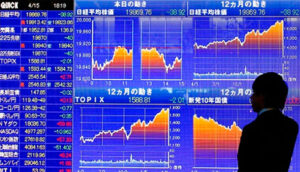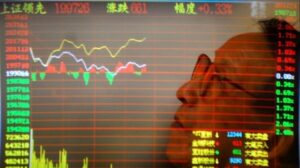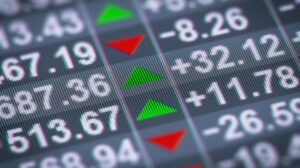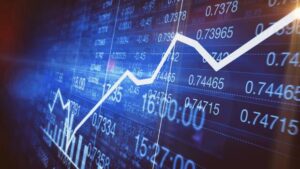
Stock indices of the largest countries in the Asia-Pacific region on Friday declined after the negative dynamics of the U.S. stock market.
Consumer prices in Japan rose 3.2 percent year on year in March, according to the country’s Ministry of Internal Affairs and Communications. Thus, inflation slowed down from February’s 3.3% and was the lowest since September 2022.
Consumer prices in Japan, excluding fresh food (a key indicator tracked by the country’s central bank), rose 3.1% in March compared with the same month a year earlier. That matched both the February figure and analysts’ average forecast, Trading Economics reported.
Meanwhile, inflation excluding food and energy increased to 3.8% from 3.5%.
Japan’s Nikkei 225 index was down 0.25% by 8:30 a.m. ET.
Shares of carmakers Nissan Motor Co. (-3.3%) and Mazda Motor (-2.5%) and Internet company Rakuten (-2.6%) were among the leaders of the fall.
In addition, members of the financial industry are getting cheaper, including Mizuho Financial Group Inc. – by 2.3%, SoftBank Group, Dai-ichi Life Holdings Inc. and Mitsubishi UFJ Financial Group Inc. – by 2.1 percent.
Meanwhile, Tokyo Gas Co. (+5.3%), chip maker Advantest Corp. (+3.6%), transportation firm Kawasaki Kisen Kaisha Ltd. (+1.8%) and retailer J. Front Retailing Co. (+1.8%).
China’s Shanghai Composite had fallen 1.4 percent by 8:35 a.m. QE, marking its third straight negative session.
Hong Kong’s Hang Seng index is losing about 1.2%, also due to a decline in the technology sector.
Among them, shares of chipmakers Semiconductor Manufacturing International Corp. and Sunny Optical Technology Group Co. – by 4.1% and 2.9%, respectively, aluminum producer China Hongqiao Group by 4.5%, retailer Alibaba (SPB: BABA) by 3.5%, insurer Ping An Insurance by 3.2% and consumer electronics maker Xiaomi (SPB: 1810) by 2.8%.
South Korea’s Kospi index was down 0.75% by 8:31 a.m. ET.
Shares of steelmaker Posco plummeted 5.9%, automaker Hyundai Motor – 1.3%.
At the same time, the share price of Samsung Electronics Co., one of the world’s largest chip and electronics manufacturers, rose 0.3%.
Australia’s S&P/ASX 200 index was down 0.3 percent by 8:31 a.m. ET.
The capitalization of the world’s largest mining companies BHP and Rio Tinto are down 2.5% and 3.5%, respectively.
Rio Tinto in the first quarter decreased its iron ore shipments by 6% compared to the previous three months and diamond production by 28%. The company cut its 2023 copper output forecast to 590,000-640,000 tons from the previously expected 650,000-710,000 tons.

Stock indices in Japan and South Korea are rising on Monday while the Chinese indicator is sinking.
Australian and Hong Kong markets are closed due to the Easter holiday.
Japan’s Nikkei 225 stock index is up 0.4% in trading thanks to data on rising consumer confidence in the country.
Japan’s Consumer Confidence Index in March rose to a maximum of 33.9 points from 31.1 points a month earlier in May last year, according to official statistical data. The consensus forecast of experts quoted by Trading Economics had expected the index to rise to 31.9 points.
Indicators of personal income growth, employment, general standard of living and consumers’ willingness to buy durable goods rose in March.
Shares of Fast Retailing, owner of the Uniqlo brand, gained 1.6 percent in trading. Nintendo rose 3.8%, Sony gained 0.4% and Toyota Motor gained 0.2%.
Among the leaders of growth in Japan on Monday are shares of shipping companies. Nippon Yusen shares gained 3.2%, Mitsui OSK Lines gained 2.1% and Kawasaki Kisen Kaisha gained 1.9%.
The share price of Japan Display Inc. soared 21%. The Japanese company said Monday it has signed a memorandum of understanding with China’s HKC Corp. to form a strategic alliance to develop operations in OLED technology.
Japan Display and HKC plan to jointly build facilities to produce next-generation OLED displays and intend to launch mass production in 2025.
South Korea’s KOSPI stock index is adding 0.9 percent in trading.
Shares of Samsung Electronics rose 1.1% despite the weak preliminary report of the South Korean maker of smartphones and semiconductor components for the first quarter.
The company’s January-March operating profit fell 20 times in the quarter, according to preliminary data released after the market closed Friday.
Samsung also said Friday that it intends to “significantly” cut production of certain types of memory chips to streamline manufacturing operations.
South Korea’s government said late last week that it would direct 7 trillion won ($5.32 billion) over the next five years to financially support local battery manufacturers planning to build facilities in North America.
LG Electronics Inc. shares, which also released preliminary earnings Friday, are down 1.1%. The company reported a 23% decline in operating profit in the first quarter.
Shares of LG Energy Solution Ltd. rose 2.6%. The battery maker, according to preliminary estimates, increased operating profit nearly 2.5 times in the first quarter, beating experts’ expectations.
China’s Shanghai Composite stock index is losing 0.2%. Traders are worried about another round of tensions in U.S.-China relations after a meeting in the U.S. between current U.S. House Speaker Kevin McCarthy and Taiwanese Chief of Staff Tsai Ing-wen.
The Chinese army began massive military exercises around Taiwan on April 8, which an army spokesman said were “a warning to separatist forces advocating Taiwanese independence and a necessary measure to protect China’s sovereignty and territorial integrity.”
Shares of Chinese anti-virus developer 360 Security Technology lost 10% in trading, electronics maker Changsha Jingjia Microelectronics Co. – 14%, and alcohol producer Wuliangye Yibin 2.7%.

Stock indices of major Asia-Pacific countries are rising in trading on Friday, with bourses in Australia and Hong Kong not working due to the Easter holiday.
Japan’s Nikkei 225 index was up 0.2 percent by 8:42 a.m.
Shares of optical equipment maker Hoya Corp. (+2.4%), chipmaker Tokyo Electron Ltd. (+1.9%), insurer Dai-ichi Life Holdings Inc. (+1.9%) and automaker Mazda Motor (+1.9%) were among the leaders.
Meanwhile, Seven & I Holdings gained 4%. One of the largest trading companies in the world increased its net profit and revenues by about a third last fiscal year, which ended in February. However, the outlook for this fiscal year disappointed investors. The company expects its operating profit to be 513 billion yen ($3.9 billion) while analysts forecast an average of 526 billion yen.
China’s Shanghai Composite Index was up 0.3 percent by 8:47 a.m. Since the beginning of this week, it has added 1.4%, and it ends “in plus” for the fourth week in a row, said Trading Economics.
Shares of pharmaceutical companies Shouyao Beijing (+20%), Suzhou Zelgen Biopharmaceuticals (+14.8%) and Dizal Jiangsu Pharmaceutical (+11.4%) demonstrated considerable growth.
South Korea’s Kospi Index was up 1.3% by 8:40 a.m.
One of the world’s biggest chip and electronics maker Samsung Electronics Co. gained 4.5% and steelmaker Posco rose 1.4%.
At the same time, shares of automaker Hyundai Motor fell 0.2%.

Stock indices of Asia-Pacific region (APR) countries do not show unified dynamics during Monday morning trading.
Investors are estimating the statistical data from Japan and news on additional reduction of oil production by some OPEC+ countries.
As it was reported the night before 8 out of 20 OPEC+ countries announced about a voluntary reduction of oil production from May till the end of the year. According to Interfax calculations, the total reduction of oil production will amount to about 1.657 mln bpd, of which the Russian Federation and Saudi Arabia will account for 500 thousand bpd each.
Oil prices jumped up about 5% on this news. Traders are concerned that this decision may increase inflationary pressures in the world, complicating the task of central banks to return inflation to target levels, writes Trading Economics.
The U.S. authorities have already called the decision inappropriate.
Hong Kong’s Hang Seng indicator lost 0.6%. Prior to that, the index was rising four sessions in a row and ended trading on Friday at a three-week high.
Sino Biopharmaceutical (-8.2%), Wuxi Biologics (-3.9%) and Baidu Inc. (-3.4%) showed the most noticeable drops.
China’s Shanghai Composite stock index gained 0.55%.
Energy stocks were rising after a rebound in oil prices. Cnooc Ltd. gained 4.8%, Petrochina gained 1.7% and Guanghui Energy gained 2.3%. Tech stocks, including East Money Information (9.8%), 360 Security Technology (4.8%) and iFLYTEK (4%) also rose.
Japan’s Nikkei 225 index was up 0.5 percent.
As it became known on Monday, the Tankan index, which assesses the level of confidence in Japan’s economy among large companies in the processing industry, fell to 1 point in January-March from 7 points a quarter earlier.
The value of the indicator was the lowest since the fourth quarter of 2020 and failed to meet the forecasts of experts who expected a drop to 3 points.
The leaders of the decline in the Nikkei Index are shares of energy and financial companies. The price of Inpex Corp shares rose by 5.2%, Eneos Holdings – by 2.4%, Mitsubishi UFJ – by 1.2%, Sumitomo Mitsui – by 1.4%.
South Korea’s Kospi index declined 0.3%.
The market value of one of the world’s largest chip maker Samsung Electronics Co. fell by 1.6% and automaker Hyundai Motor – by 0.5%.
Australia’s S&P/ASX 200 index added 0.5%.
Retail sales in Australia rose 0.2% in February versus January, when the figure jumped 1.8%, final data showed Monday.
The rise in oil prices pushed up shares of Australian oil and gas companies Woodside Energy (5.3%), Santos (4.8%), Beach Energy (7.1%), Karoon Energy (7.9%) and Ampol (2%).
The market value of mining concern BHP Group rose 0.3%, Commonwealth Bank rose 0.6%, and coal producer Whitehaven Coal rose 3.7%.

The stock indices of the largest Western European countries are declining at the beginning of trading on Monday, followed by bank stocks.
The Stoxx Europe 600 composite index of Europe’s largest companies was down 0.6 percent at 11:18 a.m. and stood at 433.8 points.
Germany’s DAX indicator fell 0.4% from market opening, Britain’s FTSE 100 – 0.8%, France’s CAC 40 – 0.3%. Spain’s IBEX 35 lost 1%, Italy’s FTSE MIB – 0.7%.
It was announced Sunday that Swiss bank UBS is buying struggling Credit Suisse for 3 billion Swiss francs ($3.25 billion). UBS will pay 0.76 francs per Credit Suisse share. The deal will be paid in full in cash.
In the course of trading on Monday quotations of Credit Suisse shares collapsed by almost 60% – down to 0.78 francs. Price of UBS securities fell by 9.9%. The UBS shares are the leaders of the decrease among the companies included in the calculation of the Stoxx 600.
Shares of other European banks are also getting cheaper: ING down 6.6%, Deutsche Bank down 6.4%, Intermediate Capital Group down 4.8%, Barclays down 4.7%, Standard Chartered down 4.1%, HSBC down 3.1%, NatWest down 3% and Commerzbank down 3.7%, Societe Generale – 4.4%, Credit Agricole – 1.9%, BPER Banca – 3.8%, UniCredit – 2.3%, Banco de Sabadell – 3.7%, Unicaja Banco – 3.3%, CaixaBank – 2%, Banco Santander – 1.7%.
Oil prices were followed by declines in fuel producers, including Repsol down 1.9%, BP Plc (SPB: BP) down 0.5%, Shell (SPB: RDS.A) down 1.4%, TotalEnergies (SPB: TOT) down 1.1%.
The price of Electrolux securities is increasing by 2.7%. The Swedish household appliances maker said its financial targets remain unchanged. In particular, the company is going to reach 6% operating profit margin in the mid-term.
Meanwhile, the growth rate of producer prices (PPI) in Germany slowed to its lowest in seventeen months in February, according to the country’s statistical office. The index rose 15.8% compared to the same month last year thanks to a less significant increase in energy costs.
Analysts had expected a 14.5% increase, according to Trading Economics.
The PPI index in February relative to the previous month decreased by 0.3%. Thus, it declined for the fifth month in a row.

Stock indices of the largest countries in the Asia-Pacific Region (APR) are down in trading on Friday, following the U.S. stock market.
The pressure on stock markets is being put by renewed fears over further interest rate hikes amid a resilient U.S. economy, which was indicated by fresh statistical data, and hawkish comments from U.S. Federal Reserve (Fed) management.
Federal Reserve Bank of Cleveland (FRB) President Loretta Mester said she thought it was premature to conclude that US inflation was on a steady path toward the US central bank’s 2% target.
Although inflation has slowed somewhat since last summer, it is still too high, Mester said during an event at the University of South Florida on Thursday. Last week’s January Consumer Price Report showed that core inflation is slowing little, she said.
St. Louis Fed Chairman James Ballard said during a speech in Tennessee that he called for a sharper rate hike at the last Fed meeting and did not rule out a sweeping move further down the road.
Japan’s Nikkei 225 Index was down 0.7 percent by 7:13 a.m.
Shares of Internet company Rakuten Group Inc. (-5.5%), Recruit Holdings Co. Ltd., which owns job search sites, (-3.9%) and industrial equipment manufacturer Keyence Corp. (-2.6%).
In addition, investment technology stocks of SoftBank Group (-2.1%), consumer electronics maker Sony (-2.3%) and Asia’s largest clothing retailer Fast Retailing (-0.7%) were getting cheaper.
China’s Shanghai Composite Index was down 0.1% by 7:23 a.m. Hong Kong’s Hang Seng lost 0.7%.
Shares of computer maker Lenovo Group Ltd. were down the most on the Hong Kong Stock Exchange. – by 4 percent, jewelry company Chow Tai Fook Jewellery Group Ltd. – by 3.8 percent and Internet company Baidu Inc. – Ltd. by 2.8 percent.
Shares of Internet giant Alibaba dropped 1.4 percent and consumer electronics maker Xiaomi Corp. – 2.4% and Internet company Meituan – 2.6%.
South Korea’s Kospi was down 0.9% by 7:23 a.m.
One of the world’s biggest chip and electronics maker Samsung Electronics Co. was down 1.7%, automaker Hyundai Motor down 0.5%.
The Australian S&P/ASX 200 index fell 0.86% in trading.
The capitalization of the world’s largest mining companies BHP and Rio Tinto decreased by 0.25% and increased by 0.5% respectively.